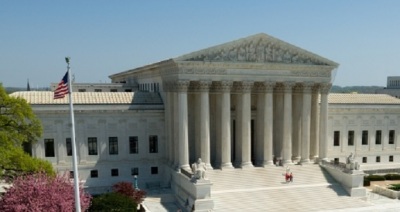Supreme Court hesitance to address gay marriage may end soon

WASHINGTON (Christian Examiner) -- Justice Clarence Thomas has hinted he and his eight colleagues on the U.S. Supreme Court were divided about hearing the same-sex cases from Indiana, Oklahoma, Utah, Virginia and Wisconsin that were passed over, Oct. 6, for consideration on the current docket.
When the justices allowed these appeals court rulings -- that sanctioned same-sex marriage in the five states -- to stand, some viewed the action as an indication the court was not going to stand in the way of the wholesale redefinition of marriage.
In a statement penned by Thomas and attached to an unrelated Supreme Court opinion on immigration, the justice expressed his displeasure with the high court's refusal to hear the cases involving the overturning of state laws, several of them that allowed gays to wed.
When the court vacated a stay in an Arizona case (Maricopa County, Arizona v. Angel Lopez-Valenzuela) giving incarcerated immigrants in the state the right to post bail, Thomas, with Justice Antonin Scalia joining him, attached a statement indicating a desire for the court to at least give a hearing to cases "striking down state laws." They noted it once was common for the Supreme Court to "review decisions striking down state laws, even in the absence of a disagreement among lower courts."
"But for reasons that escape me, we have done so with any consistency, especially in recent months," Thomas wrote.
The statement referenced cases in which the Fourth, Seventh, Ninth and Tenth Circuit Courts opened the door to gay marriage in six states.
While Thomas with Scalia indicated the court should be hearing cases in which lower courts' found state laws unconstitutional, other justices appear not so anxious to get involved.
Moderate and left-leaning justices on the court appear content to allow lower courts to settle the matter, in finding state laws banning gay marriage unconstitutional.
Supreme Court Justice Ruth Bader Ginsburg said during a session at the University of Minnesota Law School in September there was "no urgency" for the court to get involved because lower courts were all going the same way on the issue.
The dramatic support for homosexual marriage in these lower federal courts appears to trend with the changes President Obama has been able to effect in the makeup of the courts.
The New York Times reported in September that for the first time in a decade "judges appointed by Democratic presidents considerably outnumber judges appointed by Republican presidents" and that Democratic appointees who hear full cases "now hold a majority of seats on nine of the 13 United States Courts of Appeals."
"The more liberal justices have been reluctant to press this issue to an up-or-down vote until more of the country experiences gay marriage," Walter E. Dellinger III told the New York Times. "Once a substantial part of the country has experienced gay marriage, then the court will be more willing to finish the job." Dellinger was acting United States solicitor in the Clinton administration.
Yet with the Sixth U.S. Circuit Court of Appeals having gone against the tide by upholding gay marriage bans in Ohio, Michigan, Kentucky and Tennessee early this month, it is becoming more likely the issue will land on the U.S. Supreme Court's docket sooner rather than later.
RELATED ARTICLES
Building Legacy, Obama Reshapes Appellate Bench
6th Circuit: 32 million citizens of Ky, Mich, Ohio & Tenn have authority on marriage, not judges